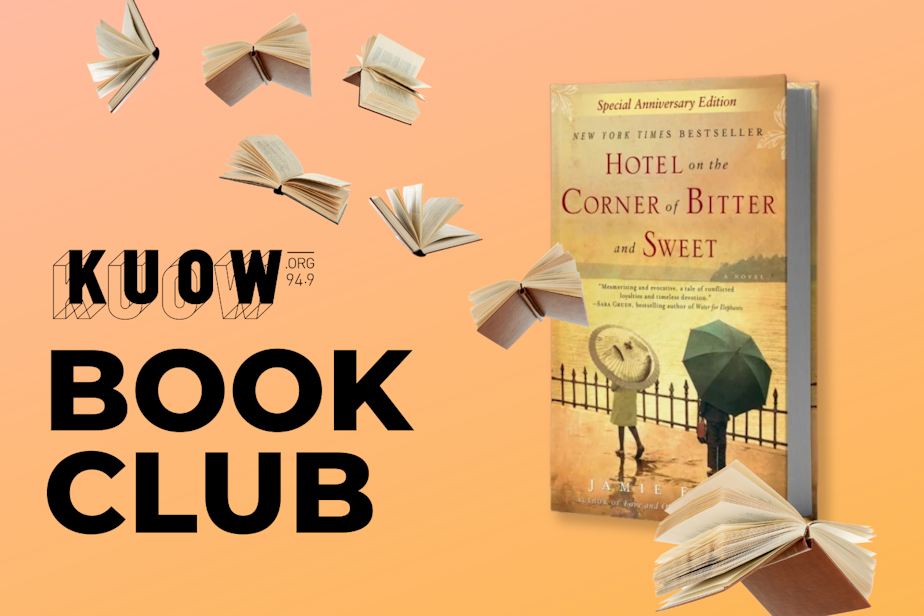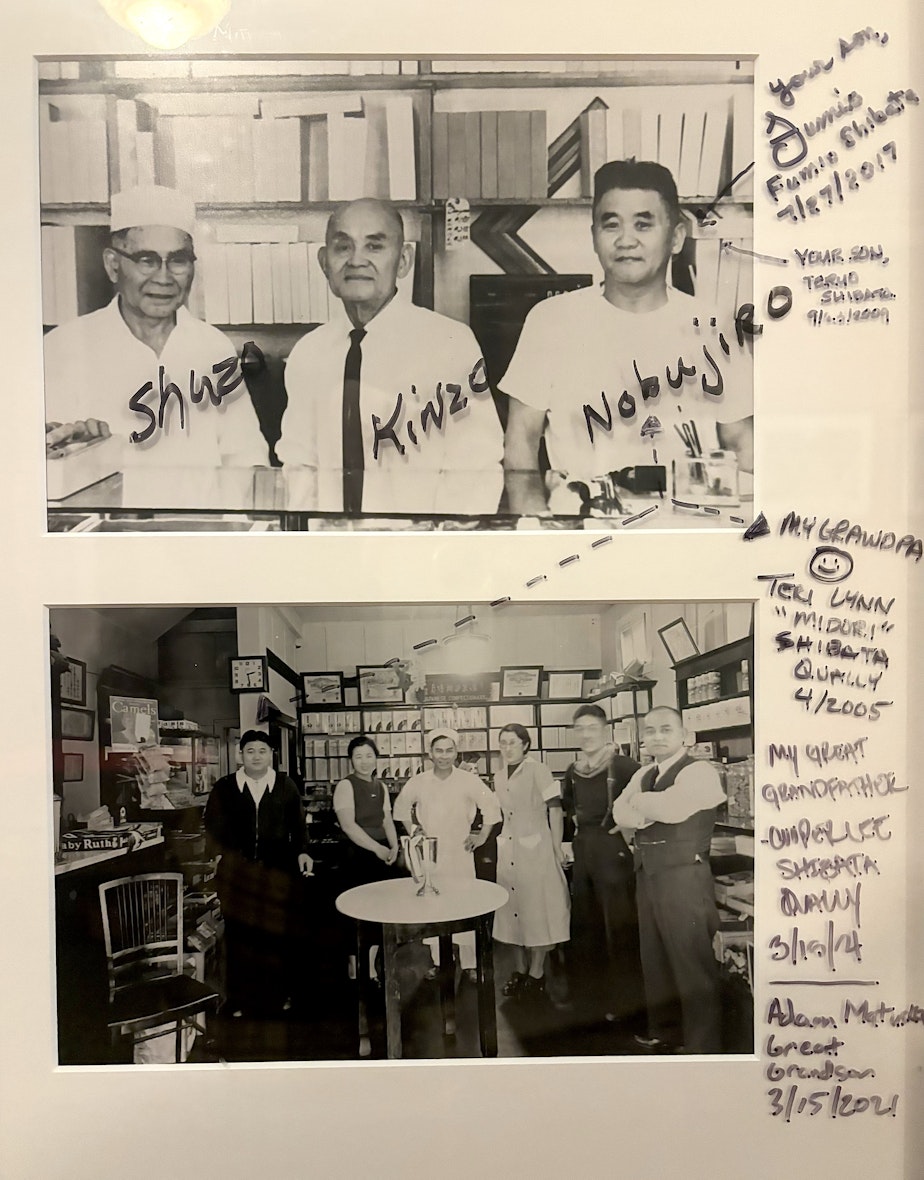Book Club Check-in: The heart-rending true love story behind 'Hotel on the Corner of Bitter and Sweet'

This is KUOW's book club, and we’re wrapping up Jamie Ford’s "Hotel on the Corner of Bitter and Sweet." I'm your club guide Katie Campbell. I hope you enjoyed our club's first pick.
T
he end of "Hotel on the Corner of Bitter and Sweet" lived up to the title almost too perfectly. I cried. I laughed. I rejoiced in an ending that delivered on the hope Ford so carefully cultivated throughout the novel. In short, I couldn't have asked for more.
And here's what made it so amazing: Ford's beautiful ending was not exactly a product of his imagination — it was the true story of his grandfather, his yéye.
I recently met Ford at the Panama Hotel and talked to him about the book for over an hour. What he shared made the book all the more powerful.
RELATED: Get to know the Pacific Northwest with KUOW’s new book club
Sponsored
Ford's grandparents, who lived on Seattle's Beacon Hill, were married about 60 years. His grandmother passed away first. Ford said he worried about his grandfather, because "often the surviving spouse is not long for this world."
So, it was a shock to Ford when one day, almost exactly a year after his grandmother had passed, his grandfather came out of his bedroom with his suitcase and asked to be taken to the airport. "Don't wait up," he told Ford.
"I would do anything my grandfather asked me to do without question, because I just respect him," Ford said. "Meanwhile, I'm quietly freaking out on the inside."
The end of this story will be familiar to readers — it's his main characters', Henry and Keiko's, story.
Sponsored
RELATED: Time's role in 'Hotel on the Corner of Bitter and Sweet' by Jamie Ford
Ford's grandfather flew to New York that day to reunite with a woman he'd dated when he was 16 years old. Her mother had died when they were together as teens, and her mother's last wish was for her to finish her schooling in China. The woman, Amy, went.
"So, my grandfather and his first love were separated," Ford said.
They carried on with their lives, much like Henry and Keiko do in the book. They married other people and didn't see each other for decades.
"Then once [my grandfather] was a widower, someone put them in touch, and she was a widow," Ford said. "He moved out to New York, and he and Amy shacked up. It was awesome. It's like my 88-year-old grandfather kind of pressing the reset button on his heart."
Sponsored
He spent his last four years with Amy.
"You don't want to strip mine your family's history for monetary gains," Ford said of his decision to include that in the book. "But for me, it's a way of honoring him and remembering him."
As I've mentioned before, I often wonder how much authors share about themselves in their books. I put that question to Ford, asking how much of himself and his family are in this iconic novel.
"This is a question that I used to dodge all the time, because, I don't know, I didn't want to be that vulnerable or that transparent. But there's a ton of me in Henry," Ford said. "I didn't get along with my dad. I mean, it took a lot to sort of process and reconcile things, which is tragic. He's been gone for 20 years now. So, you know, he was gone for five year when the book was published. So, he never really got to see this, but he's definitely a part of it."
RELATED: Jamie Ford is a heartbreaker
Sponsored
Ford's father was from China and was the same age as Henry during World War II. Ford said his father told him stories when he was a kid, stories that didn't become entirely clear until Ford was an adult himself.
His father talked about wearing an "I am Chinese" button, for example — an artifact from that time that, of course, plays an important role in the book.
"It's part of the job description of a parent to exaggerate the hardships of your childhood. So when when my dad had mentioned [he wore one of those buttons], I'm just a know-nothing kid," he said. "I just dismissed all these stories that he had. And then, when I was doing research after he had passed, I bumped into these things that were true. And then suddenly, I saw my dad's kooky stories in a completely different light."
RELATED: What does 'home' mean to us?
Listen to the full interview with Jamie Ford by clicking the play button at the top of the page.
Sponsored

Not surprisingly, the book has become a way for others to remember their loved ones, too.
Ford talked about the experience of writing about the Japanese American incarceration from a Chinese perspective, the only perspective he felt he could truly own. Over the years, he's heard from a number of people who were sent to camps or whose family members were during WWII. The impact a book like "Hotel on the Corner of Bitter and Sweet" can have — the trauma it may represent for the Japanese community — was not lost on him.
Ford recalled the story of one woman he met: "Her father went to Minidoka, and she could never talk to him about it. But they could read the book together, and they could talk about the book."
They cried together and "had to hug it out."
"It made me realize this book, that I had no idea would have this kind of readership, it really belongs to a lot of people, especially that community," he said.
And it belongs to Seattle.

Today, book clubs like ours continue to come together around "Hotel on the Corner of Bitter and Sweet," and it's taught in classrooms across the region and country.
In fact, we met one local high school student at the Panama Hotel as Ford and I settled in for our interview.
She saw my copy of the book on the table and said she'd just finished reading it with her class — she was actually at the hotel for extra credit. And when I told her the man sitting across from me was the author himself, I swear her eyes lit up. She got a selfie with Ford and had a moment to talk to him about the book. It was a heartening scene.
Ford recalled when he was the student's age, he was the kid who "cries at sad movies" — he was sensitive.
"That's not an asset in high school, like, girls are not lining up to go to prom with that guy. But as a writer, all the things I perceived as my weaknesses as a kid became my superpowers. And now, you know, I've grown up and become homework," he joked as we wrapped up the interview. "It feels like I've used my superpowers for good."
I hope you enjoyed "Hotel on the Corner of Bitter and Sweet." Subscribe to the book club newsletter here, and come back on May 27 to find out what we'll be reading next.
Listen to the full interview with Jamie Ford by clicking the play button at the top of the page.




